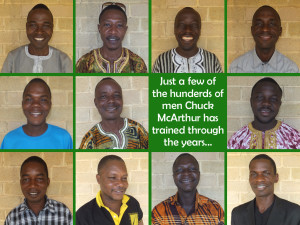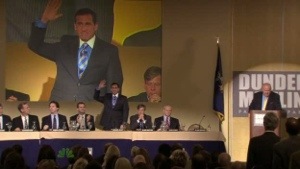It might look a little like this tomorrow. Might.
In rooms 122 & 124 tomorrow is a great opportunity to dialogue with some of our Local & Global Partners. Join Moderator Rick Kingsley either at 9 or 10:30.
Brittany French (UF)
Frank Stankunas (short term trips)
Julie Stout (Bulgaria)
Josh Dickenson (Uganda)
Oh yes, the Chili Cook Off was splendid.

In Numbers 11, we hear Moses basically say these words. And God does.
Church government is organized for service, not dominion, Church office serves both the Lord and his people. The Old Testament concept of elders as representatives of the people not simply carried over from patriarchal societies. It was founded by God’s command when, in response to the plea of Moses, the Lord told him to assemble seventy elders acknowledged by the people to share with him the burden of judging Israel (Numbers 11:16). These elders were set apart to their office by a gift of the Spirit. They were not only judges, but also spokesmen for the people (Deuteronomy 19:12; 21:19; Exodus 3:16; 4:29; 24:1-2; 1 Samuel 8:4; 2 Samuel 5:3).
In the New Testament, they are still called ‘elders of the people’ (Matthew 21:23; 26:3, 47; 27:1). When Luke, who has spoken of the elders of Israel in his Gospel (Luke 22:66), first mentions the elders of the church in Jerusalem (Acts 11:30), he assumes that their office and function will be understood. Those elders meet in the Christian council, just as Jewish elders met in the Sanhedrin (Acts 15). –Ed Clowney
One joy of having Chuck McArthur speak during our Global Mission Conference is that he brings experience training local men in the Scriptures. He is following the pattern the Apostle Paul urged upon Timothy: “The things you have heard me say in the presence of many witnesses entrust to reliable people who will also be qualified to teach others.” 2 Timothy 2:2
 See you at 6pm Friday for the Chili Cook Off and a message from Chuck. Read about Restore Liberia on his site.
See you at 6pm Friday for the Chili Cook Off and a message from Chuck. Read about Restore Liberia on his site.
There is also a wonderful program designed just for children that will take place after the Chili Cook Off.
Job 1 : Bible Overview Reading Plan
The book of Job is matchless for causing us to reflect on the question of innocent suffering. That is made clear in Job 1, which in some ways sets up the rest of the book. Job “was blameless and upright; he feared God and shunned evil” (Job 1:1). Although Job was blessed with wealth and a large family, he took nothing for granted. He even engaged in what might be called preemptive intercession on behalf of his grown children: he prayed and offered sacrifices on their behalf, fearful that perhaps at an otherwise innocent gathering, one of his children had sinned and cursed God (Job 1:5).
Job does not know, as the reader knows, that another drama is playing out in the throne room of God. Little is said about these “sons of God,” these angels, who approach the Almighty; little is said about Satan, though transparently he is evil and lives up to his name, “Accuser.” The exchange between Satan and God accomplishes three things. First, it sets up the drama that unfolds in the rest of the book. Second, implicitly it establishes that even Satan himself has restraints on his power and cannot act outside God’s sanction. Third, it discloses that Satan’s intention is to prove that all human loyalty to God is nothing more than crass self-interest, while God’s intention is to demonstrate that a man like Job is loyal and faithful regardless of the blessings he receives or does not receive.
Job, of course, knows nothing of these arrangements. He couldn’t, for the drama that follows would be vitiated if he did. In short order Job loses his wealth and his children, all to “natural” causes that Job knows full well remain within God’s sway. When the last bit of bad news reaches him, Job tears his robe and shaves his head (both signs of abasement) and worships, uttering words that become famous: “Naked I came from my mother’s womb, and naked I will depart. The LORD gave and the LORD has taken away; may the name of the LORD be praised” (Job 1:21).
The narrator comments, “In all this, Job did not sin by charging God with wrongdoing” (Job 1:22)—which of course means, in the context of this chapter, that God’s assessment of the man was right and Satan’s was wrong.
–DA Carson, For the Love of God
This academic year CCC is reading through a bible overview reading plan.
http://christcommunitychurch.com/blog/2013/09/18/bible-overview-reading-plan/
About This Blog
This blog is one of the primary ways that Christ Community's staff can connect and share information. Look for important updates on our community life here each week.
Visit the CCC Website.
View our Church Calendar.
Reminders & Reflections
Blog Archive
- June 2015
- May 2015
- April 2015
- March 2015
- February 2015
- January 2015
- December 2014
- November 2014
- October 2014
- September 2014
- August 2014
- July 2014
- June 2014
- May 2014
- April 2014
- March 2014
- February 2014
- January 2014
- December 2013
- November 2013
- October 2013
- September 2013
- August 2013
- July 2013
- June 2013
- May 2013
- April 2013
- March 2013
- February 2013
- January 2013
- December 2012
- November 2012
- October 2012
- September 2012
- August 2012
- July 2012
- June 2012
- May 2012
- April 2012
- March 2012
- February 2012
- January 2012
- December 2011
- November 2011
- October 2011
- September 2011
- August 2011
- July 2011
- June 2011
- May 2011







